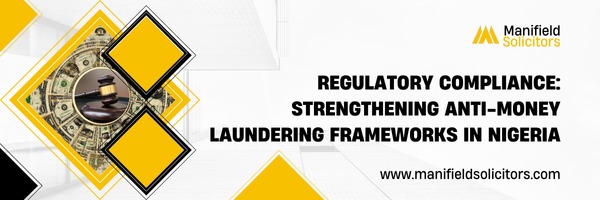As financial crimes evolve, Anti-Money Laundering (AML) frameworks continue to be a critical area of focus for regulators across the globe. Nigeria, with its rapidly increasing financial and technological landscape, is not exempt from this scrutiny. The regulatory and legal landscape for Anti-Money Laundering in Nigeria has matured over the years, but compliance gaps persist, and the costs of non-compliance can be devastating for both businesses and the wider economy.
In this publication, we delve briefly into what money laundering is, the risks of non-compliance with AML regulations in Nigeria, the existing legal frameworks, and the steps businesses can take to fortify their compliance strategies.
What is Money Laundering?
Money laundering is simply the process by which illicitly obtained money is made to appear legitimate by disguising its origins. According to the Money Laundering (Prevention and Prohibition) Act, 2022(“the Act”), an offense of money laundering is the act of concealing or disguising the origin of, converting or transferring, removing from jurisdiction, or acquiring possession or controlling of funds or property that are known or reasonably assumed to be proceeds of an unlawful act.[i] Criminals inject illegal funds into the financial system, move them through complex transactions, and eventually integrate them into the legal economy, making it difficult to trace the original illegal source.
Under the Act, money laundering is defined broadly to include not only traditional financial activities but also activities by non-financial institutions that enable criminals to “clean” illegally acquired funds.
The Act outlines several offenses and some of the key offenses include:
- Direct or indirect concealment, disguise, conversion, transfer, removal, or acquisition of any funds or property that are the proceeds of an unlawful act.
- Actions such as warning an individual involved in a suspicious transaction, destruction of records, conducting transactions under false identity, making or accepting cash payments exceeding prescribed amounts, and failing to report international transfers.
- Retention of proceeds of an unlawful Act
- Conspiracy, Aiding, and Abetting an offense under the Act
- Offenses committed by a body corporate due to the instigation or connivance of directors or officers.
Nigeria’s AML Legal Framework: An Overview
Nigeria’s primary legislation on money laundering includes:
- Money Laundering (Prevention and Prohibition) Act[ii]: This Act strengthens the regulatory and compliance mechanisms by expanding the scope of money laundering offenses and introducing more stringent penalties. The MLPPA 2022 established the Special Control Unit against Money Laundering (SCUML), the body responsible for the supervision of designated non-financial businesses and professions (DNFBPs), and ensuring compliance with the provisions of this Act, relevant laws and applicable regulations[iii].
- Economic and Financial Crimes Commission (EFCC) Act[iv]: The EFCC serves as the principal law enforcement agency for tackling money laundering and other financial crimes.
- Nigerian Financial Intelligence Unit (NFIU) Act[v]: The NFIU is tasked with receiving and analyzing Suspicious Transaction Reports (STRs) from financial and non-financial institutions.
- Central Bank of Nigeria (CBN) AML/CFT Regulations[vi]: These regulations target financial institutions, requiring them to implement robust AML and Combating the Financing of Terrorism (CFT) measures. It enables the CBN to diligently enforce AML/CFT/CPF measures and ensure effective compliance by Financial Institutions.
- Terrorism Prevention and Prohibition Act[vii]: This Act provides measures to enable Nigeria to act effectively in the fight against the financing of terrorism, including mechanisms regarding reporting of suspected incidents of financial and other support for terrorist entities.
Compliance Requirements for DNFBPs
The designated non-financial businesses and professions (DNFBPs) are outlined in Section 30 of the Act. These businesses are required to adhere to the following obligations under the Act to prevent and detect money laundering activities:
- Registration and Certification with SCUML: Section 17(2) (a) states that all designated non-financial businesses and professions must register and obtain certification from the SCUML Special Control Unit against Money Laundering to ensure compliance with the provisions of the Act and applicable regulations.
- Customer Identification: Businesses must identify and verify the identities of customers using reliable documents, particularly for transactions above certain thresholds (e.g., US$1,000 or its equivalent for occasional transactions)[viii].
- Record Keeping: Maintain records of all transactions for at least five years, allowing competent authorities to reconstruct individual transactions when needed[ix].
- Reporting Suspicious Transactions: Report any suspicious transactions to SCUML, especially those involving unjustifiable frequency, complex conditions, or those suspected of having no lawful objective.[x]
- Internal Procedures, Policies, and Controls: Develop internal measures such as the appointment of compliance officers, regular staff training, centralization of collected information, and setting up an internal audit unit to ensure adherence to anti-money laundering regulations.[xi]
- Transaction Reporting: DNFBPs must report transactions exceeding N5,000,000 for individuals or N10,000,000 for corporate bodies to SCUML within seven days.[xii]
- Identification of Politically Exposed Persons: Implement enhanced due diligence measures to identify and verify customers or beneficial owners who are politically exposed persons (PEPs).[xiii]
The Cost of Non-Compliance
Failure to comply with Nigeria’s AML regulations can result in significant financial, reputational, and operational costs. Some of the key areas of concern include:
- Monetary Sanctions
Businesses that fall short of AML requirements may face severe fines. For instance, under the Money Laundering (Prevention and Prohibition) Act[xiv], companies that fail to implement necessary AML measures or report suspicious transactions can be fined up to ₦25 million. Banks and financial institutions are particularly vulnerable, as they are highly regulated under both domestic and international standards.
- Reputational Damage
The reputational impact of non-compliance can be devastating. Companies found guilty of aiding or abetting money laundering not only face public backlash but also lose credibility with investors, clients, and partners. The long-term loss of trust can cripple business operations, especially for firms operating in financial services, real estate, and legal consulting.
- Business Interruption/Operational Disruption
Regulatory breaches can lead to suspension of licenses, business closures, and operational disruptions. The Central Bank of Nigeria has the authority to revoke licenses for financial institutions that fail to adhere to AML/CFT regulations[xv]. Disruption in operations due to regulatory action can cost companies millions in lost revenue and productivity.
- Legal Liabilities and Criminal Prosecution
Individuals and corporate bodies that are found to be non-compliant can face legal action, including imprisonment for individuals involved in money laundering schemes. Directors, compliance officers, and senior management are particularly at risk of prosecution if they are found to have facilitated or neglected their AML obligations.
Strengthening AML Compliance: Key Steps for Businesses
To mitigate the risks of non-compliance, businesses need to take proactive steps in bolstering their AML frameworks. Here are some strategies that can help:
- Conduct Regular Risk Assessments
Assessing risks is the foundation of any robust AML program. Businesses must continually evaluate the money laundering risks associated with their operations, clients, and markets. This helps in tailoring appropriate AML measures and ensuring compliance with legal standards.
- Enhance Due Diligence Procedures
Customer Due Diligence (CDD) and Know Your Customer (KYC) procedures are critical in detecting and preventing money laundering activities[xvi]. Enhanced due diligence is particularly important for high-risk clients or transactions involving politically exposed persons (PEPs) and high-risk jurisdictions.
- Invest in AML Technology
Many financial institutions and businesses are increasingly leveraging technology to enhance their AML frameworks. AML software that integrates artificial intelligence, machine learning, and data analytics can help in identifying suspicious transactions and generating real-time alerts for immediate action.
- Employee Training and Awareness
Regular training is essential to ensure that employees at all levels are familiar with AML regulations and the importance of compliance. The CBN and EFCC often emphasize the need for ongoing education to keep staff aware of emerging risks and regulatory changes.
- Develop a Compliance Culture
AML compliance must be embedded into the organizational culture. A strong tone at the top, supported by management, can help foster an environment where compliance is taken seriously. This includes ensuring that compliance officers and departments are adequately resourced and empowered to enforce AML policies.
- Regularly Update AML Policies and Procedures
AML policies must be dynamic and regularly updated to keep pace with evolving threats and regulatory changes. This also includes ensuring that procedures for reporting suspicious transactions are clear and adhered to by all employees.
Conclusion: The Imperative of Compliance
The cost of non-compliance with AML regulations in Nigeria can be overwhelming. Companies that ignore their obligations not only face financial penalties but also risk reputational damage and business disruption. As Nigeria continues to strengthen its regulatory frameworks in line with international standards, businesses must prioritize AML compliance as a core component of their risk management strategies.
Ensuring a well-structured, robust AML framework is no longer an option but a necessity for businesses operating in Nigeria. This will not only safeguard your organization from the costs of non-compliance but also promote financial transparency and security in the Nigerian economy.
We hope you find this helpful as you navigate the complexities of Nigeria’s evolving AML landscape.
REFERENCES
[i] Section 18(2) of the MLPPA 2022
[ii] Money Laundering (Prevention and Prohibition) Act, 2022
[iii] Section 17(1) of the MLPPA 2022
[iv] Economic And Financial Crimes Commission (Establishment) Act 2004
[v] Nigerian Financial Intelligence Unit (NFIU) Act, 2018. See also, NFIU Guidelines. Available at: Advisory & Guidance – Nigerian Financial Intelligence Unit (nfiu.gov.ng)
[vi] See: Central Bank of Nigeria (Anti-Money Laundering, Combating the Financing of Terrorism and Countering Financing of Proliferation of Weapons of Mass Destruction in Financial Institutions) Regulations, 2022. Available at: https://www.cbn.gov.ng/Out/2022/FPRD/AML%20CIRCULAR%20AND%20REGULATIONS%20MERGED.pdf
[vii] TPPA 2022
[viii] Section 4 of MLPPA
[ix] Section 8, MLPPA
[x] Section 7 of the MLPPA
[xi] Section 10 of the MLPPA
[xii] Section 11 of the MLPPA
[xiii] Section 10 of the MLPPA
[xiv] 4(7) of MLPPA 2022
[xv] Section 10(2) of MLPPA 2022
[xvi] CBN (Customer Due Diligence) Regulations 2023







Your perspective on this is very refreshing!
You’ve given me a lot to think about here.